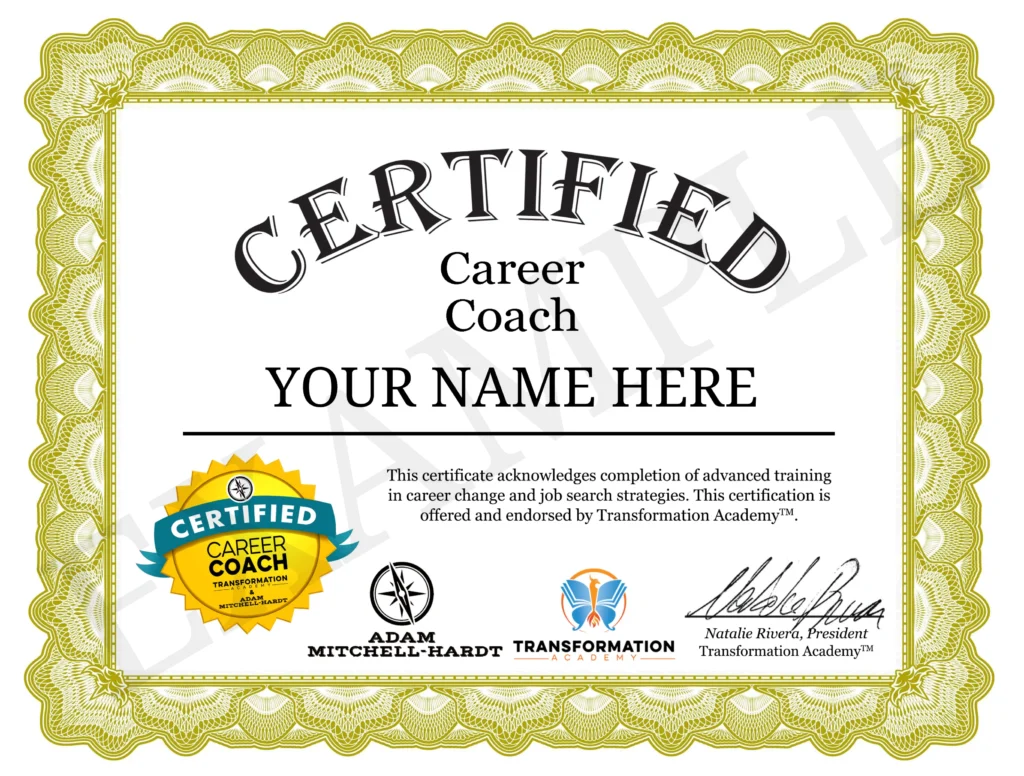What is a Career Coach?
As a career coach, you’re someone who guides individuals through their professional journeys, helping them navigate everything from job transitions and skill-building to personal development and goal setting. Your role is all about empowering clients to unlock their potential, identify their strengths, and take meaningful steps toward achieving their career aspirations. You work with clients to set realistic goals, build confidence, and create actionable plans to reach their objectives. Ultimately, you’re there to provide the clarity, tools, and support that make the often-overwhelming career landscape easier to navigate.
Why Career Coach Certification Matters
Getting a career coach certification is one of the best investments you can make in your coaching career. Certification validates your skills and expertise, setting you apart as a credible and knowledgeable professional in the field. It tells clients that you’re committed to high standards and have undergone rigorous training to provide effective, ethical guidance.
Here’s why pursuing certification is so valuable:
- Boosts your credibility: Clients look for coaches they can trust, and certification is a powerful way to demonstrate that you’ve mastered the skills needed to support them effectively. This credibility can make a real difference in building strong client relationships.
- Elevates your coaching skills: Certification programs provide you with a structured approach to learning advanced coaching methods, communication techniques, and ethical guidelines. Through certification, you’re equipped to offer high-quality, personalized guidance that meets the diverse needs of your clients.
- Opens up more opportunities: Being certified not only makes you more attractive to potential clients but also opens doors to partnerships with organizations that value certified coaches. Many companies and individuals prefer certified professionals, which can mean more clients, better rates, and enhanced career opportunities.
Assessing Your Coaching Goals and Specializations
Before diving into a career coach certification program, it’s essential to take a step back and think about what kind of coach you want to be. Career coaching can encompass many areas, from career transitions and leadership development to work-life balance. Reflecting on your goals and identifying your niche will help you find the certification program that best suits your aspirations and the clients you want to serve.
Here are some steps to help you clarify your coaching path:
- Consider your interests and strengths: Think about what topics energize you the most. Do you enjoy helping people navigate career changes, or are you more drawn to supporting clients in honing leadership skills? Perhaps you have a passion for helping individuals find a better work-life balance. By identifying these interests, you can choose a certification program that aligns with the type of coaching you’re passionate about.
- Define your coaching specialization: Many certification programs offer specializations, such as life coaching, business coaching, relationship coaching, or financial coaching. By aligning your certification with a specific niche, you’ll be better equipped to address the unique challenges your clients face and become known as an expert in that area.
- Align your goals with certification requirements: Different certification programs have unique focuses, requirements, and approaches. Choosing a program that aligns with your goals ensures that the training you receive is directly relevant and valuable to the clients you intend to serve. This alignment not only makes your certification more meaningful but also enhances your effectiveness as a coach.
Selecting the right career coach certification program based on your goals and specializations will give you the tools and knowledge you need to succeed. It will also position you as a trusted expert who can deliver high-impact coaching tailored to specific client needs. Taking the time to reflect on your goals now will ensure you choose the path that’s most fulfilling and aligned with your long-term vision.
Evaluating Accreditation and Recognition
When selecting a career coach certification program, one of the most crucial factors to consider is accreditation. Choosing a program accredited by well-established organizations, such as the International Coaching Federation (ICF), can have a significant impact on your professional reputation and client trust. Accredited programs have undergone rigorous evaluation processes to meet high industry standards, ensuring that the education and training they provide are reliable and of top quality.
Here’s why accreditation and recognition matter:
- Builds client trust: Clients are more likely to trust and choose coaches who hold certifications from reputable organizations. An ICF-accredited certification, for example, signals that you’ve been trained according to established ethical and professional standards. This credibility reassures clients that they’re working with a qualified professional dedicated to their growth and success.
- Enhances professional standing: A recognized certification can differentiate you from others in the coaching field. Accreditation often means adhering to industry best practices and a commitment to ongoing development. This can open doors to more high-profile clients, partnerships, or coaching opportunities with companies that prioritize certified professionals.
- Increases marketability: Accreditation from respected bodies like ICF doesn’t just make you stand out; it also broadens your reach in the coaching industry. Organizations and clients worldwide recognize these certifications, making it easier to expand your client base beyond local boundaries.
Analyzing Curriculum and Training Methods
Choosing the right career coach certification program means carefully examining the curriculum to ensure it offers the essential components needed to build a successful coaching practice. A robust certification program typically includes a mix of foundational coaching methodologies, ethical standards, and hands-on practical applications. Here’s what to look for:
- Coaching methodologies: Seek out programs that teach established coaching frameworks, such as cognitive behavioral approaches, motivational interviewing, or goal-setting models. These methodologies form the basis of effective coaching and give you structured techniques to guide clients through career challenges.
- Ethics and standards: Ethical practices are a critical part of any coaching relationship. A quality certification program will emphasize ethical guidelines, client confidentiality, and best practices that help you build a trust-based relationship with clients.
- Practical applications: Look for programs that offer real-life coaching simulations, case studies, or mentorship opportunities. This hands-on experience is invaluable for applying theoretical knowledge in real coaching scenarios, preparing you for the challenges of working with actual clients.
In addition to the curriculum, consider the training format that best suits your learning style and schedule:
- Online programs: These are ideal if you need flexibility and prefer learning at your own pace. Many online programs offer interactive components like video sessions, discussion forums, and digital workbooks.
- In-person programs: If you thrive in a classroom setting and value face-to-face interactions, in-person programs provide a more traditional learning environment. This format may also offer stronger networking opportunities with peers and mentors.
- Hybrid programs: Combining both online and in-person elements, hybrid programs offer flexibility with the added benefit of periodic live sessions. This option can be ideal for those who want a balanced approach to learning.
Considering Time Commitment and Flexibility
When pursuing a career coach certification, it’s essential to be mindful of the time and commitment required. Certification programs vary widely in duration, ranging from a few weeks to several months. Before committing, consider how the program’s schedule fits with your existing personal and professional responsibilities.
Here are some points to consider:
- Program duration: Short-term programs (4-12 weeks) might cover the basics quickly, while longer-term certifications (6-12 months) often offer more in-depth training and supervised practice. Understanding the time required will help you choose a program that aligns with your availability and goals.
- Balancing responsibilities: Juggling certification with other commitments can be challenging. Look for programs that offer flexible schedules, such as self-paced modules or evening classes, so you can fit learning into your routine without overwhelming yourself.
To make the most of your certification journey, here are some time management tips:
- Set a realistic schedule: Dedicate specific hours each week to studying and stick to it as closely as possible. Consistency is key to making steady progress.
- Break down tasks: Divide larger study goals into manageable tasks. Instead of covering a full module in one go, break it down into smaller sessions that you can complete over several days.
- Leverage support: If the program offers mentorship or peer groups, make use of these resources. They can provide encouragement and accountability, helping you stay on track with your goals.
Reviewing Costs and Return on Investment
When considering a career coach certification program, it’s important to look at the full scope of costs involved, from tuition to additional expenses like materials or exam fees. Here’s a breakdown of potential costs:
- Tuition fees: The cost of certification programs can vary significantly based on the depth and length of the course, with some introductory programs costing a few hundred dollars and more comprehensive programs running into thousands.
- Materials and resources: Some programs include learning materials in their tuition fees, while others require additional purchases, such as textbooks or access to digital resources. Make sure to account for these costs in your budget.
- Additional fees: There may be other fees for registration, exams, or renewal of certification down the line. It’s worth researching these upfront so you’re fully prepared for all financial aspects.
Once you understand the costs, consider the potential return on investment (ROI) of your certification. A quality certification program can provide long-term benefits that justify the initial expenses, including:
- Attracting more clients: Being a certified career coach makes you more credible, helping you stand out and attract clients who seek professional guidance.
- Higher earning potential: Certified coaches often charge higher rates than uncertified ones, allowing you to recoup your investment and build a sustainable income.
Evaluating these factors can help you make an informed decision on whether a certification program’s value aligns with your career and financial goals. Ongoing support, networking, and continued learning help you grow professionally and ensure you can deliver the best results for your clients.
Conclusion
Choosing the right career coach certification is an investment in both your professional development and the success of your future clients. From evaluating accreditation and aligning with your coaching goals to considering costs and post-certification support, every step in the process can bring you closer to becoming a trusted, effective career coach. Taking the time to choose a program that matches your aspirations and offers the right resources will set you on a rewarding path toward a thriving coaching practice.
If you’re ready to take the next step in your coaching journey, explore Simply.Coach’s comprehensive resources and tools tailored for career coaches like you. With Simply.Coach’s leading digital coaching platform, you’ll have access to everything from integrated scheduling and client management to in-app personalization and analytics, all designed to help you provide impactful, personalized coaching experiences. Book a demo with Simply.Coach today to see how the platform can elevate your coaching practice and support your goals.







